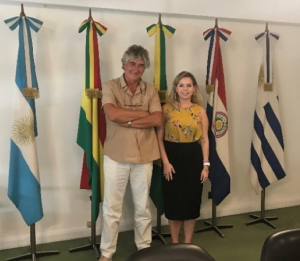Hello, my name is Isabela Battistello Espindola, I’m 29 years old and I am a PhD visiting researcher here at King’s Geography. I graduated with a bachelor’s degree in International Relations and Economics from FACAMP (Faculty of Campinas), Brazil, and a master’s degree in Environmental Sciences from Federal University of Sao Carlos (Sao Carlos, Brazil). Now, I am doing my doctorate in Human Geography at the Department of Geography, University of Sao Paulo (Sao Paulo, Brazil). I received a fellowship from the Foundation for Research Support of the State of São Paulo to develop my doctorate studies. And due to that fellowship, I could apply to receive an international doctorate fellowship to develop my research studies abroad. And I ended up coming to King’s to do that. I am really excited to be in King’s, to be part of King’s Water and to be in London! I think this is a huge opportunity for me.
You might be asking what I am studying. My PhD research focuses on the management of transboundary water resources in South America and it takes the La Plata Basin as a study case. South America has almost 30% of the world’s water reserves (Did you know that?), with 25 out of 310 transboundary river basins. More than half of South America’s territory is covered by such basins (Quite amazing, isn’t it?). Despite its wealth of water, South America is not exempt from water-related conflicts (Yeah, sadly we have those). The La Plata Basin is one of the main South American river basins, being shared between Argentina, Brazil, Bolivia, Paraguay and Uruguay. With an area of 3.1 million km², the La Plata Basin is the fifth largest river basin on the planet. The second largest in South America (The first is the Amazon basin, but I think that you already know that). The La Plata basin has more than 75 large dams spread across its territory, and an estimated population of over 100 million.
My research focuses on the La Plata basin management, importance and recognition before the States and regional institutions (such as MERCOSUL, U.N.), using possible contributions from the Intergovernmental Committee of the Countries of The La Plata Basin (CIC), it’s own international river organization, for the development of institutional and legal frameworks for South American transboundary waters management. (The photo above is with the Secretary of CIC).
Water issues are relevant to any State’s agenda. This is common fact. Water is a natural resource of high importance to all living beings, gaining social, economic and political relevance in our society. Its quantitative distribution is not homogeneous and the maintenance of its quality to meet the different demands has been compromised by the diverse uses and inefficiency of water management systems. In the case of transboundary waters, the problem is even greater, as they need exclusive legal treatment, since they are located in two or more countries, causing consequences for all those who share. This is the case of South America.
Why come to research at King’s? One of the main strands of analysis and studies of geopolitics and international relations around transboundary waters is hydropolitics. This aspect permeates aspects of international conflicts and cooperation related to transboundary water resources. Through a bibliometric survey (shown in the partial report presented to the Foundation for Research Support of the State of São Paulo for Process 2017/17997-9), I discovered that King’s College London stands out in terms of productivity on the subject of hydropolitics. In addition, Dr. Naho Mirumachi is one of the main references on the subject. The TWINS matrix, a methodology for the analysis of conflict relations and international cooperation related to transboundary water resources, developed by Professor Mirumachi, is a novelty and has not yet been applied to the case of the La Plata Basin.
The Department of Geography excels through a critical approach to development theories, ideologies, practices and policies, conducting empirical research on a variety of geographical configurations and scales from the international to the local. With respect to research, the department brings together a number of themes linked to the issue of development, such as water resources management, vulnerability to disasters, global health policies, modernism and decolonization, environmentalism, consumer practices, migration and livelihoods urban. It is a world reference center.
King’s Water specializes in both the environment and development, covering the social and physical sciences to explore the challenges of water governance, from global to local scales. It is an interdisciplinary group that works on the biophysical, political, socioeconomic, development and institutional aspects of water resources and their management. Among the main themes are research on conflict, cooperation and water security, as well as institutions for allocation and access to water. Research through King’s Water ranges from theoretical discussions, socio-political analysis of water interactions and innovation to methods and tools related to remote sensing, hydrological policy support systems and ecotoxicology. These themes, particularly on the political and institutional aspects of water conflict and cooperation intersect with my research.
Finally… do I like my research? For sure! I believe that this is an extremely relevant and urgent, once it seeks to discuss the problematic surrounding the issue of transboundary waters, taking the La Plata Basin in South America as a study case, considering aspects of geopolitics, hydropolitics, international relations, among others in its analysis and discussions.
… and what happens next? Plans for the future? For sure is to finish my PhD and start my postdoc as soon as possible. Also, I would like to return to teaching, because I really like it and miss it.
If you want to learn more about Isabela’s research, contact her at isabela.battistelle@gmail.com or King’s Water Research Assistant, Veronica Horvath, at veronica.horvath@kcl.ac.uk
Keep up to date with her research via google scholar here.